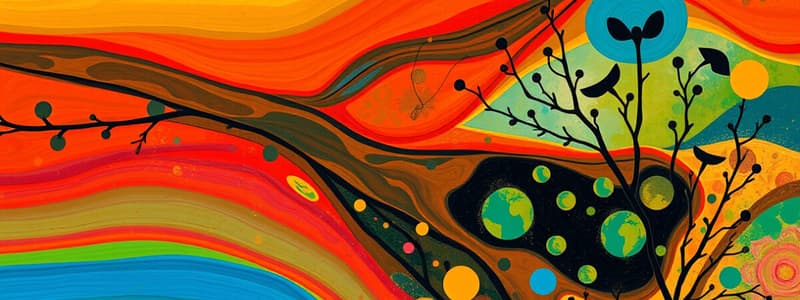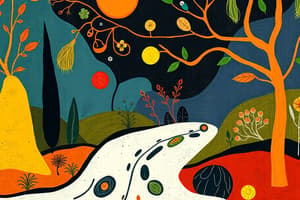Podcast
Questions and Answers
What is ecology?
What is ecology?
- The study of nonliving factors in an organism's environment.
- The process of nitrogen fixation.
- The scientific discipline studying relationships among living organisms and their environments. (correct)
- A large group of ecosystems.
What is the biosphere?
What is the biosphere?
The portion of Earth that supports life.
What are biotic factors?
What are biotic factors?
The living factors in an organism's environment.
What are abiotic factors?
What are abiotic factors?
What is a population?
What is a population?
What is a biological community?
What is a biological community?
What is an ecosystem?
What is an ecosystem?
What is a biome?
What is a biome?
What is a habitat?
What is a habitat?
What is a niche?
What is a niche?
What is predation?
What is predation?
What is symbiosis?
What is symbiosis?
What is mutualism?
What is mutualism?
What is commensalism?
What is commensalism?
What is parasitism?
What is parasitism?
What is an autotroph?
What is an autotroph?
What is a heterotroph?
What is a heterotroph?
What is a herbivore?
What is a herbivore?
What is a carnivore?
What is a carnivore?
What is an omnivore?
What is an omnivore?
What is a detritivore?
What is a detritivore?
What is a trophic level?
What is a trophic level?
What is a food chain?
What is a food chain?
What is a food web?
What is a food web?
What is biomass?
What is biomass?
What is matter?
What is matter?
What is a nutrient?
What is a nutrient?
What is a biogeochemical cycle?
What is a biogeochemical cycle?
What is nitrogen fixation?
What is nitrogen fixation?
What is denitrification?
What is denitrification?
Flashcards
Ecology
Ecology
The scientific study of how living things interact with each other and their environment.
Biosphere
Biosphere
All the parts of Earth where life exists.
Biotic Factors
Biotic Factors
Living parts of the environment (plants, animals, etc.).
Abiotic Factors
Abiotic Factors
Signup and view all the flashcards
Population
Population
Signup and view all the flashcards
Biological Community
Biological Community
Signup and view all the flashcards
Ecosystem
Ecosystem
Signup and view all the flashcards
Biome
Biome
Signup and view all the flashcards
Habitat
Habitat
Signup and view all the flashcards
Niche
Niche
Signup and view all the flashcards
Predation
Predation
Signup and view all the flashcards
Symbiosis
Symbiosis
Signup and view all the flashcards
Mutualism
Mutualism
Signup and view all the flashcards
Commensalism
Commensalism
Signup and view all the flashcards
Parasitism
Parasitism
Signup and view all the flashcards
Autotroph
Autotroph
Signup and view all the flashcards
Heterotroph
Heterotroph
Signup and view all the flashcards
Herbivore
Herbivore
Signup and view all the flashcards
Carnivore
Carnivore
Signup and view all the flashcards
Omnivore
Omnivore
Signup and view all the flashcards
Detritivore
Detritivore
Signup and view all the flashcards
Trophic Level
Trophic Level
Signup and view all the flashcards
Food Chain
Food Chain
Signup and view all the flashcards
Food Web
Food Web
Signup and view all the flashcards
Study Notes
Key Concepts in Ecology
- Ecology: Scientific study of relationships among living organisms and their interactions with the environment.
- Biosphere: The global sum of all ecosystems; the part of Earth where life exists.
Environmental Factors
- Biotic Factors: Living components of the environment such as plants, animals, and microorganisms.
- Abiotic Factors: Nonliving components including sunlight, water, soil, and temperature.
Population and Community
- Population: Group of individuals of a single species living in a specific area at the same time.
- Biological Community: Interacting populations of different species that inhabit the same geographic area concurrently.
Ecosystems and Biomes
- Ecosystem: Includes a community of organisms and their physical environment, encompassing both biotic and abiotic factors.
- Biome: A broader classification that encompasses large groups of ecosystems sharing similar climate and community structures.
Organism Habitats and Roles
- Habitat: Specific environment where an organism resides.
- Niche: Unique role of an organism within its environment, including its behavior, habitat, and interactions.
Interactions Between Organisms
- Predation: One organism capturing and feeding on another for nutrition.
- Symbiosis: Close biological relationship between two or more species, which can be mutualistic, commensalistic, or parasitic.
- Mutualism: Both organisms benefit from the interaction.
- Commensalism: One organism benefits while the other is unaffected.
- Parasitism: One organism benefits at the expense of the other.
Nutrition and Energy Flow
- Autotroph: Organisms that produce their own food through photosynthesis or chemosynthesis.
- Heterotroph: Organisms that obtain energy by consuming other organisms.
- Herbivore: Only eats plants.
- Carnivore: Predominantly eats other animals.
- Omnivore: Consumes both plants and animals.
- Detritivore: Feeds on decomposing organic matter, facilitating nutrient recycling.
Food Chains and Webs
- Trophic Level: Position in a food chain or web, indicating the flow of energy.
- Food Chain: Simple representation of how energy moves from one organism to another.
- Food Web: Complex network of interconnected food chains illustrating energy flow among a variety of organisms.
Matter and Nutrients
- Biomass: Total mass of living matter at a particular trophic level.
- Matter: Anything with mass and volume.
- Nutrient: Essential chemical substances that organisms acquire from their environment for growth and survival.
Biogeochemical Processes
- Biogeochemical Cycle: Movement of matter through the biosphere, involving biological, geological, and chemical processes.
- Nitrogen Fixation: Conversion of atmospheric nitrogen into forms usable by plants, primarily facilitated by bacteria.
- Denitrification: Process where fixed nitrogen compounds are converted back into nitrogen gas by certain bacteria.
Studying That Suits You
Use AI to generate personalized quizzes and flashcards to suit your learning preferences.
Description
Test your knowledge of key terms and concepts in Biology Chapter 2, focusing on the principles of ecology. This set of flashcards covers essential vocabulary such as ecology, biosphere, biotic and abiotic factors, providing a comprehensive review for students. Perfect for exam preparation and reinforcing your understanding of ecological relationships.




